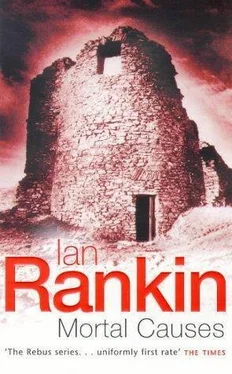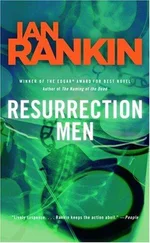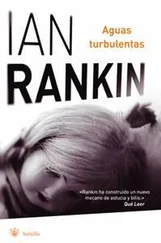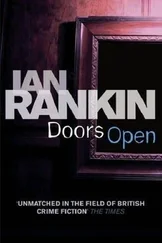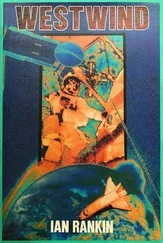The photo showed a tattoo on the victim's right forearm. It was a rough, self-inflicted affair, the kind you sometimes saw on teenagers, usually on the backs of hands. A needle and some blue ink, that's all you needed; that and a measure of luck that the thing wouldn't become infected. Those were all the victim had needed to prick the letters SaS into his skin.
`It's not the Special Air Service,' said Rebus.
`No?’
Rebus shook his head. 'For all sorts of reasons. You'd use a capital A for a start. More likely, if you wanted an SAS tattoo you'd go far the crest, the knife and wings and "Who dares wins", something like that.’
`Unless you didn't know anything about the regiment,' offered Lauderdale.
`Then why sport a tattoo?’
`Do we have any ideas?’ asked the Farmer.
`We're checking,' said Lauderdale.
'And we still don't know who he is?’
'No, sir, we still don't know who he is.’
Farmer Watson sighed. 'Then that'll have to do for now. I know we're stretched just at the minute, with the Festival threat and everything else, but it goes without saying this takes priority. Use all the men you have to. We need to clean this up quickly. Special Branch and the Crime Squad are already taking an interest.’
Ah, thought Rebus, so that was why the Farmer was being a bit more thorough than usual. Normally, he'd just let Lauderdale get on with it. Lauderdale was good at running an office. You just didn't want him out there on the street with you. Watson was shuffling the papers on his desk.
`I see the Can Gang have been at it again:' It was time to move on. Rebus had had dealings in Pilmuir before. He'd seen a good policeman go wrong there. He'd tasted darkness there. The sour feeling returned as he drove past stunted grass verges and broken saplings. Though no tourists ever came here, there was a welcome sign. It comprised somebody's gable end, with white painted letters four feet high: ENJOY YOUR VISIT TO THE GAR-B.
Gar-B was what the kids (for want of a better term) called the Garibaldi estate. It was a mish-mash of early 60s terraced housing and late '60s tower blocks, everything faced with grey harling, with boring swathes of grass separating the estate from the main road. There were a lot of orange plastic traffic cones lying around. They would make goalposts for a quick game of football, or chicanes for the bikers. Last year, some enterprising souls had put them to better use, using them to divert traffic off' the main road and into the Gar-B, where youths lined the slip-road and pelted the cars with rocks and bottles. If the drivers ran from their vehicles, they were allowed to go, while the cars were stripped of anything of value, right down to, tyres, seat-covers and engine parts.
Later in the year, when the road needed digging up, a lot of drivers ignored. the genuine traffic cones and as a result drove into newly dug ditches. By next morning, abandoned vehicles had been stripped to the bone. The Gar-B would have stripped the paint if they could.
You had to admire their ingenuity: Give these kids money and opportunity and they'd be the saviours of the capitalist state. Instead, the state gave them dole and daytime TV. Rebus was watched by a gang of pre-teens as he parked. One of them called out.
`Where's yir swanky car?’
`It's no' him,' said another, kicking the first lazily in the ankle. The two of them were on bicycles and looked like the leaders, being a good year or two older than their cohorts. Rebus waved them over.
'What is it?’
But they came anyway.
'Keep an eye on my car,' he told them. `Anyone touches it, you touch them, okay? There's a couple of quid for you when I get back.’
'Half now,' the first said quickly. The second nodded. Rebus handed over half the money, which they pocketed.
`Naebody'd touch that car anyway, mister,' said the second, producing a chorus of laughter from behind him.
Rebus shook his head slowly: the patter here was probably sharper than most of the stand-ups on the Fringe. The two boys could have been brothers. More than that, they could have been brothers in the 1930s. They were dressed in cheap modern style, but had shorn heads and wide ears and sallow faces with dark-ringed eyes. You saw them staring out from old photographs wearing boots too big for them and scowls too old. They didn't just seem older than the other kids; they seemed older than Rebus himself.
When he turned his back, he imagined them in sepia.
He wandered towards the community centre. He'd to pass dome lock-up garages and one of the three twelve-storey blocks of flats. The community centre itself was no more than a hall, small and tired looking with boarded windows and the usual indecipherable graffiti. Surrounded by concrete, it had a low flat roof, asphalt black, on which lay four teenagers smoking cigarettes. Their chests were naked, their t-shirts tied around their waists. There was so much broken glass up there, they could have doubled as fakirs in a magic show. One of them had a pile of sheets of paper, and was folding them into paper planes which he released from the roof. Judging by the number of planes littering the grass, it had been a busy morning at the control tower.
Paint had peeled in long strips from the centre's doors, and one layer of the plywood beneath had been punctured by a foot or a fist. But the doors were locked fast by means of not one but two padlocks. Two more youths sat on the ground, backs against the doors, legs stretched in front of them and crossed at the ankles, for all the world like security guards on a break. Their trainers were in bad repair, their denims patched and torn and patched again. Maybe it was just the fashion. One wore a black t-shirt, the other an unbuttoned denim jacket with no shirt beneath.
'It's shut,' the denim jacket said.
`When does it open?’
'The night. No polis allowed though.’
Rebus smiled. 'I don't think I know you. What's your name?’
The smile back at him was a parody. Black t-shirt grunted an undeveloped laugh. Rebus noticed flecks of white scale in the youth's hair. Neither youth was about to say anything. The teenagers on the roof were standing now, ready to leap in should anything develop.
`Hard men,' said Rebus. He turned and started to walk away. Denim jacket got to his feet and came after him.
'What's up, Mr Polisman?’
Rebus didn't bother looking at the youth, but he stopped walking. `Why should anything be up?’
One of the paper planes, aimed or not, hit him on the leg. He picked it up. On the roof, they were laughing quietly.
`Why should anything be up?’ he repeated.
`Behave. You're not our usual plod.’
'A change is as good as a rest.’
`Arrest? What for?’
Rebus smiled again. He turned to the youth. The face was just leaving acne behind it, and would be good looking for a few more years before it started to decline. Poor diet and alcohol would be its undoing if drugs or fights weren't. The hair was fair and curly, like a child's hair, but not thick. There was a quick intelligence to the eyes, but the eyes themselves were narrow. The intelligence would be narrow too, focusing only on the main chance, the next deal. There was quick anger in those eyes too, and something further back that Rebus didn't like to think about.
'With an act like yours,' he said, 'you should be on the Fringe.’
`I fuckn hate the Festival.’
'Join the club. What's your name, son?’
'You like names, don't you?’
'I can find out.’
The youth slipped his hands into his tight jeans pockets. 'You don't want to.’
`No?’
A slow shake of the head. `Believe me, you really don't want to.’
The youth turned, heading back to his friends. `Or next time,' he said, `your car might not be there at all.’
Читать дальше
